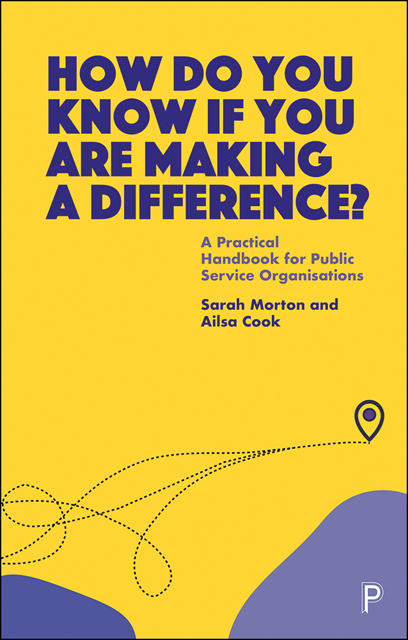 How Do You Know If You Are Making a Difference?
How Do You Know If You Are Making a Difference? Book contents
- Frontmatter
- Dedication
- Contents
- List of figures and tables
- Acknowledgements
- Preface
- 1 Why is it so hard to know if you are making a difference?
- 2 Why complexity thinking can help you understand public services
- 3 What data and evidence do you need to see what difference you are making?
- 4 Embrace the complex contex
- 5 Embrace the complex context
- 6 Clarify the change you want to see
- 7 Get going on your data, evidence and feedback improvement journey
- 8 Tracking progress towards outcomes and impacts
- 9 Telling the story of the difference your work makes
- 10 Using this approach in different contexts and sectors
- 11 Becoming an outcome- and impact-focused organisation
- References
- Index
4 - Embrace the complex contex
Published online by Cambridge University Press: 20 June 2023
- Frontmatter
- Dedication
- Contents
- List of figures and tables
- Acknowledgements
- Preface
- 1 Why is it so hard to know if you are making a difference?
- 2 Why complexity thinking can help you understand public services
- 3 What data and evidence do you need to see what difference you are making?
- 4 Embrace the complex contex
- 5 Embrace the complex context
- 6 Clarify the change you want to see
- 7 Get going on your data, evidence and feedback improvement journey
- 8 Tracking progress towards outcomes and impacts
- 9 Telling the story of the difference your work makes
- 10 Using this approach in different contexts and sectors
- 11 Becoming an outcome- and impact-focused organisation
- References
- Index
Summary
Being clear about the difference an initiative wants to make and the outcomes or the impacts of the work is the first step in knowing whether it is making a difference. Taking the time to really understand how the work contributes to intended outcomes or impacts brings other benefits too. Getting a clear sense of what matters and the change the work is seeking to make in the world is vital when navigating a complex environment. Having a clear vision for where the work is heading acts as a beacon, providing a firm direction whatever changes around it.
Internationally, public services are dripping with references to outcomes, impacts, outputs, goals and results. Many of the organisations we work with around the world are in a situation where they need to report to or align with multiple outcome frameworks and indicators, sometimes for the same work. This can result in organisations feeling caught in a tangle of outcomes, expected to respond and adapt to the range of approaches taken by their funders, commissioners, policy leads and regulators. Being able to navigate around this complex outcomes and impacts landscape is becoming a key competency for anyone leading public services where they are expected to work towards, report on or be evaluated against outcomes or impacts. This is what we call ‘owning your outcomes or impacts’.
If this picture sounds familiar, then this chapter is for you. Over the coming pages we will provide some accessible ways to understand and operationalise outcomes and impacts in your work and unpack some of the contradictions surrounding the use of outcomes and impacts within wider policy and funding systems. In this chapter we will discuss:
• navigating the landscape of outcomes and impacts;
• an introduction to outcome thinking;
• a new way of working with outcomes;
• owning your outcomes and impacts: what this means in practice.
While this chapter can’t remove the complexity of your outcomes and impacts landscape, we hope it will give you a vision for what it means to own this and to make you feel more comfortable with what it means for your work. Chapters 5 and 6 provide some practical approaches to help you realise this.
Information
- Type
- Chapter
- Information
- How Do You Know If You Are Making a Difference?A Practical Handbook for Public Service Organisations, pp. 43 - 59Publisher: Bristol University PressPrint publication year: 2022